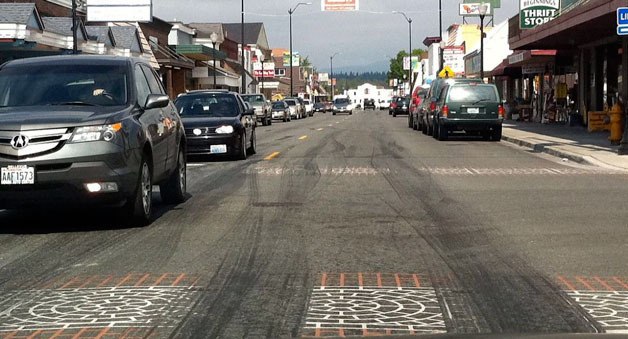ARLINGTON — Motorists and pedestrians passing through downtown Arlington have probably noticed some black marks on the city’s image, literally, on Olympic Avenue since Friday, Sept. 9.
The annual Drag Strip Reunion and Car Show didn’t begin in earnest until Saturday, Sept. 10, but with a number of auto enthusiasts arriving in town the night before, the rubber met the road hard enough to leave skid-marks that have remained visible since.
“Friday night we had some folks show up to camp out, and we had a deal where they could go to town as part of a poker run to visit area auto dealerships,” said Jake Jacobsen, the Port Gardner Vintage Auto Club’s co-chair of the Drag Strip Reunion and Car Show. “It seemed like a good deal, but it obviously got out of hand.”
Jacobsen noted that this was the first year he’d heard of such an incident occurring before the annual show, and added that show organizers such as himself hadn’t expected it in part because they’d never considered the pre-show poker run to be part of their purview.
“Not all of those cars were part of our show, but regardless, this can’t be allowed to happen again,” said Jacobsen, who explained that show organizers will be meeting with Arlington city officials to discuss how to prevent a repeat incident. “We’d already printed out sheets that said that all the drivers must obey all the traffic laws, but I guess we didn’t print them large enough.”
According to Jacobsen, his fellow Port Gardner Vintage Auto Club members have repeatedly asked him if they could schedule a time to clean up the skid-marked streets themselves, but Jacobsen explained that cleaning Olympic Avenue in an environmentally friendly way would require resources that they don’t have.
“We can’t just let the cleaning fluid run into the gutters,” Jacobsen said.
City of Arlington Capital Projects Manager Paul Ellis agreed with Jacobsen that such a cleanup would need to be performed with specific equipment, which is why the city is still weighing its options on how to clean it. He nonetheless complimented the Port Gardner Vintage Auto Club members for approaching him to volunteer their efforts.
At the same time, the black marks on Olympic Avenue have highlighted another problem on the street.
“The rubber tracks didn’t really hurt the crosswalks, but they’re just not holding up as well as we expected in certain areas,” Ellis said of the crosswalks on the pavement, which are made of impressed thermal plastic. “When the Olympic Avenue project was finished in 2007, it was a relatively new process so we weren’t totally sure, but we expected these crosswalks could last maybe 10 years. In some areas, that’s held true, and they should last another four or five years, but at the intersections with Third and Maple streets, they’re not holding up so well.”
Ellis attributed the shorter lifespan of those crosswalks to heavier usage wearing them out faster, to the point that the surface of the streets themselves has worn down below the level of the impressed thermal plastic.
“It’s not that the product or the installation is faulty,” Ellis said. “It’s just the additional cost of turning movements on those streets.”
According to Ellis, the city is weighing its cost-benefit options for these crosswalks.







